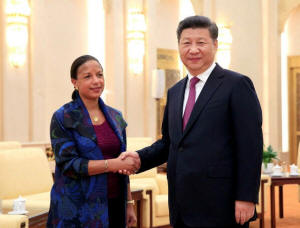|
U.S. says looking at more
counter-terrorism cooperation with China
 Send a link to a friend
Send a link to a friend
 [July 26, 2016]
BEIJING (Reuters) - The United
States is looking at ways to increase counter-terrorism cooperation with
China, including information exchanges and helping bring stability to
places like Iraq, a senior U.S. administration official said on Tuesday. [July 26, 2016]
BEIJING (Reuters) - The United
States is looking at ways to increase counter-terrorism cooperation with
China, including information exchanges and helping bring stability to
places like Iraq, a senior U.S. administration official said on Tuesday.
China was angered last month at a report by the U.S. State Department
that said there was a lack of transparency or information from China
about incidents it called terrorism, and said counter-terrorism
cooperation was limited.
China has tried to encourage Western nations in particular to help in
its fight against what it calls Islamist extremists in the
violence-prone far western Chinese region of Xinjiang operating as the
East Turkestan Islamic Movement (ETIM).
But Western countries have been reluctant to share intelligence with
China or otherwise cooperate, saying China has provided little evidence
to prove ETIM's existence and citing concern about possible human rights
abuses in Xinjiang.
Speaking to reporters on a conference call, a senior U.S. administration
official said at the end of a visit to China by U.S. National Security
Adviser Susan Rice the threat of terrorism had been discussed in "some
detail", along with the importance of Sino-U.S. cooperation in the area.

"Both sides recognize that we, as many others in the international
community do, face a threat from international terrorism," the official
said, speaking on condition of anonymity.
"We discussed some ways that we could work together to counter that
threat. Both in specific areas such as increasing exchanging of
information, but also in other ways to contribute to stability in places
like Iraq which can also have a positive goal here," he added.
"Certainly, the Chinese did raise their concerns regarding certain
organizations like ETIM and both Ambassador Rice and her counterparts
had a candid exchange on that as well," he said, without elaborating.
[to top of second column] |

National Security Adviser Susan Rice (L) shakes hands with Chinese
President Xi Jinping during their meeting at the Great Hall of the
People in Beijing, China, 25 July 2016. REUTERS/How Hwee Young/Pool

Both countries recognize they and the rest of the international
community face a clear danger from the threat of terrorism and will
keep looking for ways to increase cooperation in tackling it, he
added.
Hundreds of people have been killed in recent years in Xinjiang,
home to the Muslim Uighur people, in unrest blamed by Beijing on
Islamist militants and separatists, though rights groups say the
violence is more a reaction to repressive Chinese policies.
China says ETIM is behind the unrest, though many experts have
questioned whether ETIM exists as a cohesive militant group.
China strongly denies abusing anybody's rights in Xinjiang.
(Reporting by Ben Blanchard and Jake Spring; Editing by Robert
Birsel)
[© 2016 Thomson Reuters. All rights
reserved.]
Copyright 2016 Reuters. All rights reserved. This material may not be published,
broadcast, rewritten or redistributed.
 |